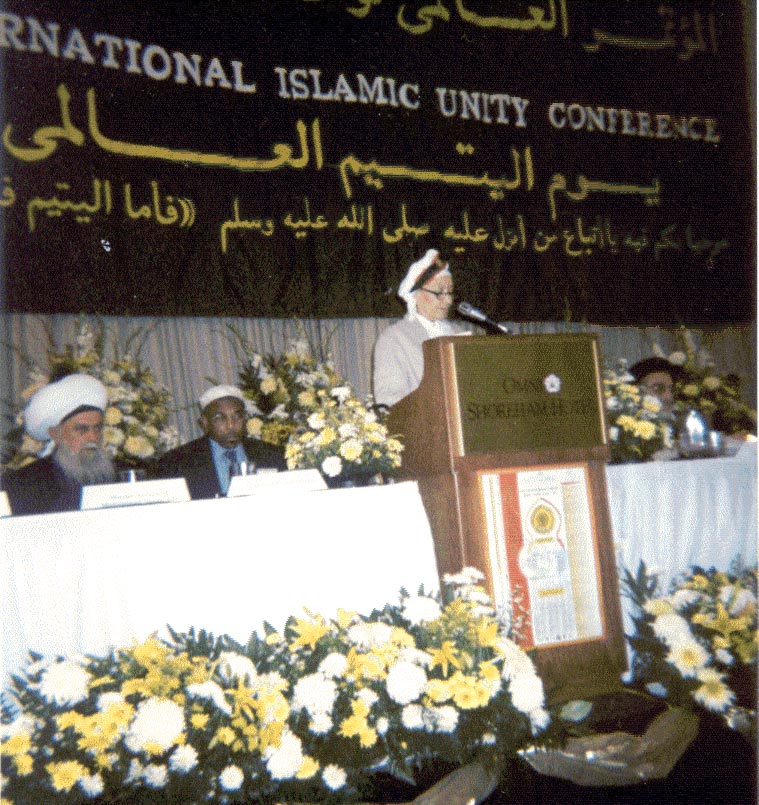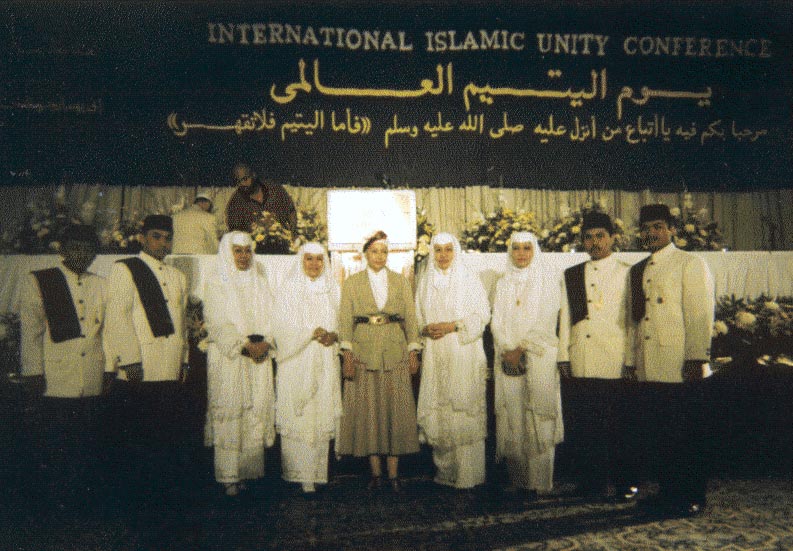
Speech
by HIH Nadine Sultana
D’Osman Han
Washington
DC, IIUC 98,
Aug.7th,

SPIRITUAL
DIMENSION
By
Copyright 1998 Nadine
Sultana d’Osman Han
Bismillah
ir-Rahman ir-Raheem
As-Salaamu
Alaykum. Greetings
to all my Brothers
and Sisters.
Balzac
wrote in l842 — “I write by the light of two eternal truths: Religion and Monarchy..”—
How
very true are these words, for Religion and Monarchy transcends from
immemorial
times from the Divine Allah. Monarchy
and Spirituality are inseparable, because a Monarch is bound by Oath to
obey
the Will of God, for the good of the people.
H.M.
Abdulhamit II was both Sultan and Caliph, therefore he embodied
perfectly these
two truths. The
very personality of the
Sultan radiated with spirituality from a very young age. One might say that for
H.M. Abdulhamit II, it
was a birthright transmitted to him over thousands of years from his
forebears.
The
genealogy called Silsilename, traces the genealogy of the Turkish
Dynasties
beginning with Adam and Eve, continuing with the ancients Prophets and
Patriarchs, and terminating with the Ottoman’s Dynasty founded by Osman
Gazi,
whose title means “Warrior of the Faith”.
The
Ottoman Sultans did surrender to complete obedience to the Will of
Allah. They did
abide by the principles of morality,
honesty, and honor mentioned in the Holy Qu’ran.
Sultan
Abdulhamit II never strayed from that path, and his people could not
fault his
honor to integrity.
H.M.
Sultan Abdulhamit II became the 98th Caliph from His Exalted Highness
EBUBEKIR,
on the day that he was girded with the Sword of Osman Gazi at Eyup, on
Friday
7, Sept l876. At
Eyup’s Tomb, the Sultan
renewed his commitment to total surrender to the Will of Allah, and to
the
principles of spirituality in the Osmanli tradition.
What
could be more gloriously appropriate, but for the Ottoman Caliph to
start the
journey of his reign from Eyup, which is the 3rd
most sacred place
in the Islamic World, after Mecca and Jerusalem.
This is because H.M. Sultan Mehmet the
Conqueror or Fatih as he is usually known, while capturing
Constantinople for
Islam, found the lost tomb of Eyup Ensari.
Eyup was the friend and standard-bearer of Prophet
Mohammed (Peace be
upon Him), and, he was among the leaders of the first Arab siege of
Constantinople, in the year 674. Eyup
was killed during the unsuccessful siege, and he was buried somewhere
outside
the walls.
Certainly,
it was the Will of Allah for such a miraculous discovery to occur, so
many
centuries later, and, only to the Conqueror of Constantinople for Islam. Shortly thereafter, Allah
Blessed again the
Ottoman Sultans with the Caliphate.
Thus,
after the Conquest of Constantinople, renamed Istanbul, Sultan Fatih,
had a
kulliye built there, named Eyup.
Perhaps,
I should explain that a kulliye is a group of buildings, which include
a
Mosque, hospital, and various other religious and philanthropic
institutions. The
kulliye of Sultan
Fatih included two tombs, one of which became the Sultan last
resting-place.
All
these facts are the very legacy that influenced the spirituality of
H.M.
Abdulhamit II, and it was to manifest itself at a very young age.
Spirituality
has many different facets of expression, one of which is good manners. Without good manners there
can be no morality
and therefore no civilization. Sultan
Abdulhamit was a serious, meditative and dignified child. He never laughed loudly. These qualities remained
with the Sultan into
his adulthood.
Another
expression of spirituality was the Sultan’s humility.
H.M. Abdulhamit II had many talents, in
calligraphy, arts, cabinet-making, in which he was truly a Master,
foreign
languages, sports, and many more subjects in which he excelled at. Yet the Sultan never
boasted of his
accomplishments. This
spiritual humility
was not understood by the many foreigners, who laughed at the Sultan or
criticized Him.
Another
aspect of the spirituality of the Sultan, was his sensitivity toward
the beauty
of nature, and to his appreciation of tranquillity.
This spirituality, led the Sultan to reject
the extravagance of Dolmabace, for the more modest small palaces set
among the
restful park of Yildiz, where the Soul could be refresh in closer
communion
with Allah.
The
Sultan Abdulhamit II enjoyed simple pleasures, such as the
contemplation of
nature, as he sipped a cup of coffee at one of the kiosk in the park,
or
listening to the songs of birds.
The
spirituality of the Sultan was also found in his gentleness towards
children
and animals. Nothing
could delight the
Sultan more, than to listen to the inexperienced musical playing of his
children. Sultan
Abdulhamit II was also
very undemanding of his wives, taking great pleasure in simple relaxing
small
talk.
Sultan
Abdulhamit was very thrifty in his needs, and very conscientious of his
duties. Deeply
pious and mystic, the
Sultan was a loner. He
worked long hours
in the interest of the people, taking no vacation during his long reign
of 33
years.
The
Sultan was also a warrior of the Faith, not with the sword, but with
spiritual
energy. The Sultan
spent great energy to
unite all Muslims, under the Banner of the Caliphate, for the Glory of
Allah,
and His Messenger Prophet Mohammed (Peace be upon Him).
Prophet
Mohammed (Peace be upon Him) encouraged the pursuit of knowledge with
the
words: — “He who
leaves his home in
search of knowledge walks in the path of God”.—
Again,
Sultan Abdulhamit II brought a spiritual dimension to this task, as he
greatly
expanded education in all fields.
The
Sultan inaugurated economic reforms and progress with the WISDOM OF
PRUDENCE,
which could be the envy of any ecologist today.
The
deepest form of spirituality of H.M. Sultan Abdulhamit II, came forth
when the
Sultan sacrificed His Sultanate, without a moment of hesitation, when
he
believed, that it would accomplish the security, and orderliness of the
country.
Unfortunately,
the ones he educated so liberally, did not live by the same high
standard of
morality as the Sultan. So,
once they
acquired the knowledge so generously bestow on them, they turned
traitor to
Allah, to their Sultan and Caliph, and destroyed their very Soul in the
process.
I
shall conclude with a few thoughts.
As
Abdulkadir Dedeoglu wrote: —
“Sultans
are like Spirits in their relation to their country”.—
To be sure, their spirits, carried on by
their descendants, did not die with the grief of exile.
Indeed,
the mystic 90 years old, Sultan Selim Hamid*, (who is the last son of
H.M.
Sultan Abdulhamid II), remains steadfast on the Spiritual path of
integrity and
humility in tradition of Islam, while his heart and soul remain
immutably
linked to the Fate of Istanbul, the City of the Ottoman Caliphs,
Istanbul, the
Pearl of Islam as it was said, and, the Siege to the Holy Relics of
Prophet
Mohammed (Peace be Upon Him).
I
shall leave you with the words of Petrus Gyllius, who said four century
ago: — “It seems to
me that while other
cities are mortal, this one will endure as long as there are men on
earth”.— Insha’Allah.
May
Allah Blessings be Upon You, Upon Islam and Turkey and upon all the
suffering
Nations. Thank you.
NOTE:
* Sultan Selim i-Rabi bin Hamid Han passed away on April 3rd,
1999


